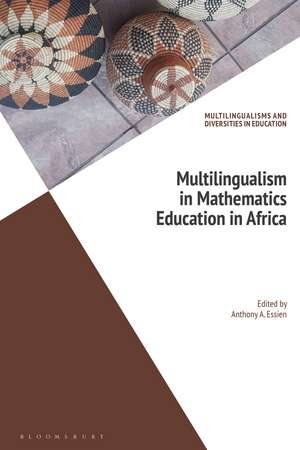Multilingualism in Mathematics Education in Africa: Multilingualisms and Diversities in Education
Editat de Dr Anthony A. Essienen Limba Engleză Hardback – 10 ian 2024
Preț: 539.39 lei
Preț vechi: 773.92 lei
-30% Nou
Puncte Express: 809
Preț estimativ în valută:
103.23€ • 107.23$ • 85.75£
103.23€ • 107.23$ • 85.75£
Carte tipărită la comandă
Livrare economică 03-17 februarie 25
Preluare comenzi: 021 569.72.76
Specificații
ISBN-13: 9781350369207
ISBN-10: 1350369209
Pagini: 256
Ilustrații: 10 bw illus
Dimensiuni: 156 x 234 x 21 mm
Greutate: 0.54 kg
Editura: Bloomsbury Publishing
Colecția Bloomsbury Academic
Seria Multilingualisms and Diversities in Education
Locul publicării:London, United Kingdom
ISBN-10: 1350369209
Pagini: 256
Ilustrații: 10 bw illus
Dimensiuni: 156 x 234 x 21 mm
Greutate: 0.54 kg
Editura: Bloomsbury Publishing
Colecția Bloomsbury Academic
Seria Multilingualisms and Diversities in Education
Locul publicării:London, United Kingdom
Caracteristici
Brings together leading scholars from Africa in the field of multilingualism and mathematics teaching, from Kenya, Namibia, Nigeria, Malawi, Morocco, Rwanda, South Africa, Tanzania and Zimbabwe
Notă biografică
Anthony A. Essien is Associate Professor of Mathematics Education at the University of the Witwatersrand, South Africa.
Cuprins
Series Editors' ForewordPreface, Anthony A Essien (University of the Witwatersrand, South Africa)Part I: Critical Engagement of Language Policies/Planning and their Implementation or Reforms in Mathematics Education1. The Concept of Language-as-(Re)Sources of Meaning from an African Perspective: Challenges and Opportunities in Mathematics Education, Anthony A Essien (University of the Witwatersrand, South Africa), Ingrid Sapire (University of the Witwatersrand, South Africa) and Matshidiso M Moleko (University of the Free State, South Africa)2. Exploring the Implications of the Multilingual Turn in Mathematics Education Research for South African Policy Makers, Researchers and Educators, Sally-Ann Robertson (University of Rhodes, South Africa) and Melony Graven (University of Rhodes, South Africa)3. Teaching and Learning Mathematics in Algeria as a Multilingual Country: Difficulties, Challenges and Hints for Future Research Studies, Nadia Azrou4. Novice Teachers' Use of Mother Tongue in Mathematics Junior Primary Multilingual Classrooms in Northern Namibia, Tulonga Tulimeutho Shuukwanyama (University of Namibia, Namibia), Jeremiah S. Maseko (University of Johannesburg, South Africa) and Caroline Long (University of Johannesburg, South Africa)Part II: Curriculum and Pedagogy Issues in Multilingual Education within Mathematics in Africa5. Multilingualism Challenges in Mathematics Education in Morocco, Moulay Driss Aqil (Pace University, USA)Part III: Support and Development of Mathematical Practices in the Teaching and Learning of Mathematics in a Specific Linguistic Setting in Africa6. Supporting the development of Content-Specific Language-Responsive Mathematical Teaching Practices in Multilingual Classrooms in Africa, Jill Adler and Anthony A Essien (University of the Witwatersrand, South Africa)7. African Language/English Bilingual Curriculum Materials: What Educative Supports does the Bala Wande Package offer Teachers? Hamsa Venkat and Samantha Morrison (University of the Witwatersrand, South Africa)8. English Medium Instruction Mathematics Teaching and Learning: Issues for Research, Rachel Bowden (University of Bristol, UK), Innocente Uwineza (University of Rwanda, Rwanda), Jean Claude Dushimimana (University of Rwanda, Rwanda) and Alphonse Uworwabayeho (University of Rwanda, Rwanda)Part IV :Language Issues in Teaching with Mathematics Register in an Indigenous (African) Language and Directions for Future Research9. Preparing Teachers to Teach Mathematics in Home Languages in Malawi: What We Know, What We Need to Know, and Directions for Future Research, Mercy Kazima, Justina Longwe and Fraser Gobede (University of Malawi, Malawi)10. Epilogue: Whose Languages? Whose Mathematics? Richard Barwell (University of Ottawa, Canada)Index
Recenzii
This book brings together works by researchers from multiple countries in Africa who share a common interest in understanding mathematics education in multilingual settings. Each chapter provides insights into particular research studies, policies, or interventions within one national or regional context. Taken as a whole, the text provides a valuable overview on the issue of language(s) and teaching mathematics in Africa. I hope this book sparks additional research and publications from mathematics educators in Africa who have valuable insights about the phenomenon of language(s) in mathematics to share with the global mathematics education research community.



